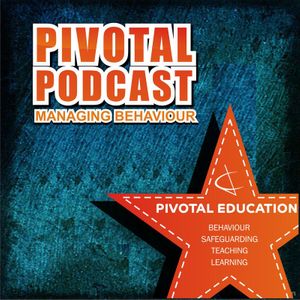Mark Anderson on How Not to Waste Money on Tech – PP102
Pivotal Podcast - A podcast by Pivotal Education

Categories:
Mark Anderson, who is perhaps better known as @ICTEvangelist on Twitter, joined us this week for a wide-ranging conversation about ICT. Mark is an influential, award-winning blogger, author and speaker. Recently recognised in this research as the most influential person in edtech in Europe and then here as the second most influential blogger in the UK. This blog also won the Education Blog of the Year 2015 in the UK Blog Awards 2015 and second in the Education section of the Vuelio Blog Awards 2015. With 20 years classroom experience including that as a teacher, middle leader, lead teacher, assistant headteacher and responsible for some of the UK’s most renowned edtech deployments, Mark is a passionate advocate for developing the modern educator’s toolkit. Can technology improve learning? Mark points out that people weren’t convinced about what impact the printing press would have and technology is similar – we couldn’t go back to ‘quill and paper’ and get the same results. When our children are at university or in work is it more or less likely they will be using technology? Of course they will be. Mark thinks one of the biggest factors causing an imbalance in the impact of technology in education is teacher confidence. Schemes like student Digital Leaders who are there to support the teacher’s use of technology can have a massive impact. In each setting where Mark has seen dramatic impact of technology on learning, it’s the children who have made the biggest difference. Even where there are great teacher technology champions in a school, they can’t be there all the time. This is where children helping teachers can be really useful – if it’s a function of a particular app or machine, it’s not worth putting a call out for technical help and children can provide scaffolding and support for teachers. Mark says that the national picture on teacher confidence with technology is patchy and points out that there are still some teachers who see it as a risk to adopt technology when their teaching is already effective – as they see it. Teacher training is also inconsistent – Mark believes that educational technology use should be embedded into teacher training more effectively, perhaps as a requirement of QTS, so we are not left with pockets of good practice. Mark mentions the use of ‘technology coaches’ in international schools whose role is to support the use of educational technology and would like to see this replicated more generally in groups of schools – academy chains, trusts, clusters etc. Virtual Reality VR is one area in educational technology Mark is excited about. For example Google Cardboard is a very cheap (or even free) way of turning existing equipment into VR equipment which can be combined with free applications such as Google Street View. He believes that children can be given immersive, powerful and authentic experiences like this. Mark has also seen immersive rooms in schools with projectors pointing at the walls so you really feel you ‘are there’. There are free, 3D panoramas on sites like Airpano.com where you can use the gyroscopic features of a mobile device to walk around and experience the virtual environment. Mark thinks VR is massively powerful not just in obvious areas of the curricul...